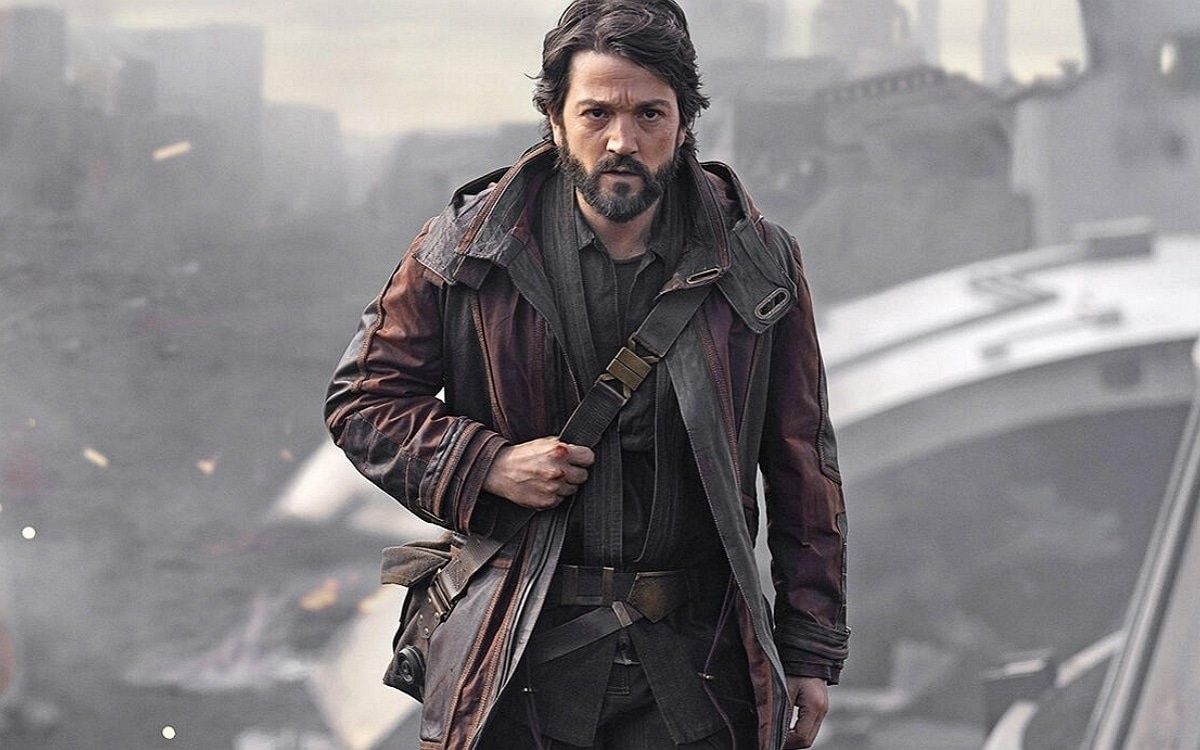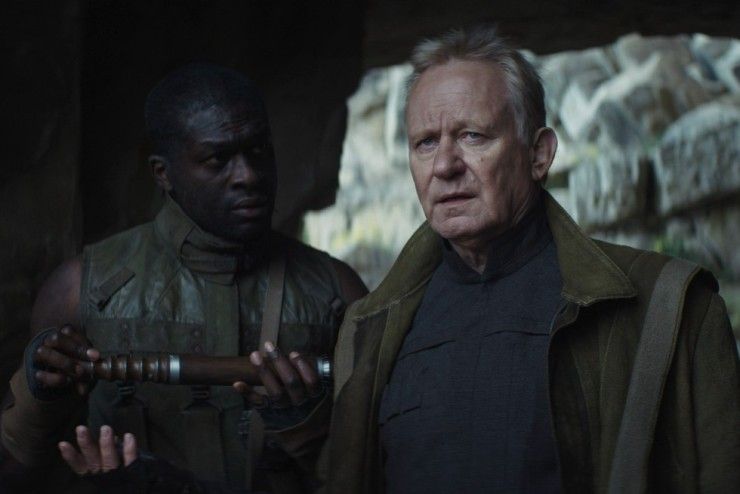
Andor is a masterclass in screenwriting. Here is how and why.
Andor is the Disney+ Star Wars entry that has delighted fans, non-fans, and critics alike. And this alone is a seemingly impossible task—the monster IP has left countless creatives in its destructive wake.
The bottom line is if you want to watch amazing scenes and stories, you don't need to look further than the live-action Star Wars series on Disney+, Andor.
I understand if maybe you did a spit take just now.
The combined legacies of Star Wars and Disney+ don't leave you thinking, "Great writing."
Good at many other things... wildly popular and successful... but a masterclass in writing?
In creating stakes and character studies? In dialogue? In crafting layered meaning? Surely not!
But I'll tell you again. It's all there. And I'm going to take the time to lay it out because frankly, I love that it's there and wish it was in everything.
And why can't it be?
An accidental masterpiece
But let's go back a bit before we dig and acknowledge that Andor being Sydney Lumet-level type shit is kind of probably a bit of an accident.
Why?
Well, first off, most good stuff is an accident. Casablanca is one of the greatest movies ever made, and, like, 15 people wrote it with 25 executives chiming in, and four directors. Well, it wasn't quite all that. But you get the point.
What about The Godfather? Another movie where a lot had to go right and wrong for various people to end up in positions where they could push through stuff that basically slipped past the goalie—and voila. Something insane and beautiful took place.
Andor isn't The Godfather or Casablanca. But it's certainly a whole new level of quality in the world of Star Wars and mainstream IP.
It's not just "dark" (everything is dark now), it's politically relevant to issues that exist today and throughout history. It comments on prison, power, office life, and workplace structure, and most of all puts human faces on major historical events and changes.

With answers that run deep and are as applicable to our lives today as they are troubling.
But showrunner Tony Gilroy contextualized all of this when he said himself in an interview with Vulture regarding these parallels:
"You can go to the Montagnards, you can go to the Urgun, you can go to the African National Congress, you can go back to the Roman revolution. Changing people’s sentences, fascism, oppression—you can pull everything."
Andor's high stakes
While that is far-ranging and complex, when it comes to the nuts and bolts of the writing, Andor does the simple things quite well. Episodes seem slow compared to traditional tentpole pacing, in that very little "happens." Characters walk around and talk about stuff.
But if you stay in the fight, so to speak, the things the characters are doing build toward satisfying conclusions.
Instead of being bum-rushed from one set piece to another, we are experiencing a series of scenes where the basic fundamental building blocks of a good story are laid in place. Stones in a pathway toward a conclusion.
These beats are the things that make an audience care from one moment to the next.
One character enters the scene wanting something, and another stands in their way.

And this extends to the larger movements.
An act is a series of scenes made from those beats. An episode would be a series of acts. A series of episodes make up a season... or a movement within that season.
But from beat to beat, Andor actually moves. It moves agendas forward, giving characters constantly evolving stakes.
This is the very heart of dynamic storytelling and narrative. You don't need an explosion in the physical sense. You need a roadblock. You need a hurdle. You need a stepladder to climb the hurdle... only to find a ditch on the other side. Then a shovel to dig out of it. Then a giant piece of rock the shovel can't crack.
And so on. It's Matt Stone and Trey Parker's "But.. Therefore..."
But there is more to it than just that.
There is a way to do this and be ineffective.
Look no further than another Star Wars series, Obi-Wan Kenobi.
The Nerdist here narrates the reasoning behind this scene's dynamic, but it literally goes like this:
"You can't go in here."
"I'm in charge of you, and I say I can."
"Oh. Okay. Go ahead."
That's not a proper beat. There isn't enough of a turn. The character needs to try something new or abandon that initial path and look for another one. When a door closes and a window opens, as they say. You don't want characters jiggling the handles.
Of course, the problem is in real life, jiggling the handle works. It's not breaking story rules or logic to say, "She just asked again but nicely." It's just not as compelling to an audience. It's not as tight.
Lessons from Andor
And the longer you build the little pieces on top of each other the more invested the audience is. Don't believe me?
Well, there is data.
Andor began as a less exciting or enticing Star Wars property. Cassian Andor, a side character from Rogue One, isn't exactly the household name Obi-Wan Kenobi is. But the series had a few things readers of No Film School can take more lessons from.
It had word of mouth.
Critical praise of Andor began early, and while the first releases had data suggesting this was the least popular Star Wars series today, the audience interest has grown, with tracking data now suggesting it has eclipsed the popularity of the platform's flagship series, The Mandalorian.
It all comes down to the writing. The slow burn paid off, people started talking, and people started watching.
Writing fundamentally sound narratives is building a well-designed structure. People can live there comfortably. And to quote another voice from the annals of cinema, "If you build it, they will come."
And all those little beats and turns adding up? They are part of one major turn, movement, or arc for a character... the title character. In Gilroy's own words to Deadline:
"...we’ll take somebody who’s completely disillusioned and completely self-interested and really having the worst day of their life, and just someone who’s turning into a roach, and we’re going to turn that person in one year, we’re going to make the first turn to being the guy who’s in Rogue One, and we’re going to make him sign up."
In writing the prequel to a character whose fate was known, he took the truly "writerly approach," which is to say he decided, "How can I wind back the clock to make this character the least likely person to become the man we know?"
It isn't enough to simply posit that idea. It has to be executed over a series of many critical challenges.
But the simple part is that if you stick to the plan, one beat at a time, and stick to the principles, you can truly build something both compelling and satisfying.
Your Comment
1 Comment
The Mandalorian looks great but the writing is akin to bad 80's evening dramas. Obi-Wan Kenobi was slightly better but still, pretty terrible writing, which is why when I started watching Andor, I was so pleasantly surprised and impressed. Writing is EVERYTHING. If you don't have a solid script, with characters who have real, meaningful relationships and real stakes in their lives, you have nothing. I would argue that, in terms of meaningful characters and relationship development, Andor sits levels far-above even George Lucas' original Star Wars, as it provides a much deeper human experience than any Star Wars story to date. And it's really no "accident"; Tony Gilroy's masterful storytelling lays the foundation for the possibility of greatness but let there be no doubt that the very talented directors, actors, crew and editors who collaborated to create Andor, created something that has set the bar to a much-needed, higher level. Given the utter lack of good writing in most Star Wars movies and spinoffs, it's honestly difficult to believe that Disney had any involvement in Andor, but sometimes even the "corporate machine" can apparently have people working within it that can surprise you. Here's hoping Andor inspires people to write better stories. I kind of doubt it, but I can only hope there are more pleasant surprises on the horizon.
December 5, 2022 at 5:14PM